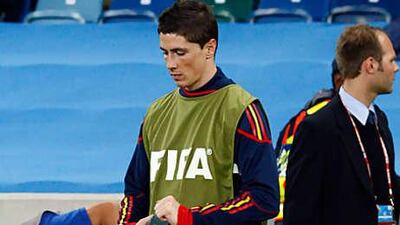Patience is a virtue the undemonstrative, unexcitable Vicente Del Bosque appears to possess in endless quantities. It is a reason why he appears the epitome of a players' manager. Yet a record of 30 wins in 32 games cannot be constructed without the occasional injection of ruthlessness. And Del Bosque, previously the epitome of stolid loyalty, displayed it. After five games, encompassing 13 shots of which only two were on target and, crucially, no goals, Fernando Torres was out. As his stand-in, Pedro, was handed a full international debut, the axe fell on the man who was the ruthless executioner of Germany in the Euro 2008 final.
Come the return fixture, the leading man had been relegated to a bit-part role. A recently shorn Torres sat on the bench. Perhaps it is the Samson effect; minus his trademark hair style, his powers have deserted him. More prosaically, Torres has struggled for sharpness since undergoing a knee operation in April. It is difficult to ease a player back to fitness in a World Cup. Pedro, the scorer of goals in six competitions in a year for club side Barcelona, can scarcely be called a novice, but he is a newcomer to this stage. A maiden start came in almost the biggest game of all. He was as bright and purposeful from the off as Spain's biggest game of the World Cup brought their best display. Without scoring, he added a spark. His guided pass provided the first opening for David Villa; Manuel Neuer saved. Two later shots narrowly missed the far post, while one was repelled by the German goalkeeper. A shot-happy striker in a side who often eschew the direct route to goal, he appeared an anomaly.
It was the approach Torres takes, though a willingness to drift across the forward line showed a greater flexibility than the dropped forward offers. Yet the striker's job is both an enviable job and an awkward one in this idiosyncratic side. There is a tendency to over-elaborate, perhaps exacerbated by their slight stature; not for them, the cross into the box. The extra pass is the favoured option among the likeminded souls in midfield.
Compared to their triumph in Vienna two years ago, there were times when it appeared less a rematch than a repeat, another exercise in retaining possession. For Sergio Busquets and Xabi Alonso, Andres Iniesta and Xavi, the means seem to take precedence over the ends; they are the pass masters. If you can't get the ball from them, you can't beat them. But what they encountered was an illustration of German resilience. Unwilling to enter a passing contest with Spain - and perhaps unable to win one - they sat back and absorbed pressure. This was old-style Germany, rather than Joachim Loew's kindergarten cavaliers.
But Spain's methods seem a constant: when Plan A is so seductive, why construct Plan B? Or so went the theory that seems to underpin Spanish football. Yet when the breakthrough came, it was in utterly uncharacteristic manner; yes, the ubiquitous Xavi was involved. But his corner was headed in by the flying Carles Puyol. It was the goal Germany, with a series of menacing set-pieces, threatened to score but the one Spain did. It was just their seventh goal of the tournament and only the second not scored by Villa. He is Barcelona bound: Puyol and Iniesta, the other scorer, are already employed at Camp Nou. When France triumphed in 1998, one British newspaper, noting the combination of Patrick Vieira and Emmanuel Petit for the third goal and rather ignoring Zinedine Zidane's double, produced a headline of: "Arsenal win the World Cup." Should Spain succeed on Sunday, a more accurate analysis could be: "Barcelona win the World Cup".
This is, however, Catalans and Castilians in harmony: seven from Barca alongside three Real Madrid players. And, with nine minutes remaining, an interloper from Liverpool. Torres was belatedly summoned; perhaps Del Bosque's next disloyal decision will be to recall him for the final. sports@thenational.ae

